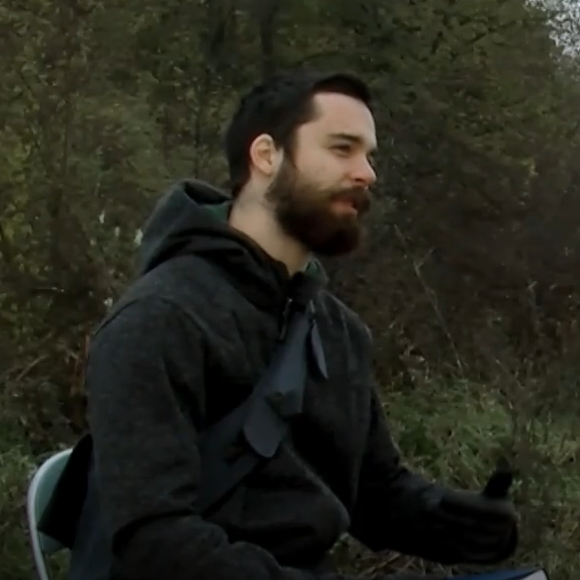Kazimir Kharza
Kazimir Kharza is an anarcho-primitivist writer and ecophilosopher. He has written multiple essays on the negative effects of technology and civilisation, having critiqued human relation with time, the nature of infrastructure, and civilised outlook on death coupled with its role and place within civilisation. Kharza mostly blogs on his website, though his work has appeared elsewhere.[1]
Life
Kharza was born in the year 2000. He was prompted to start questioning civilisation and technological progress by two main factors: witnessing the gradual degradation of his living surroundings, and the hard times he went through in the education system due to his dyscalculia, realising he's considered "disabled" for something that doesn't hinder him in the slightest outside the system.[2]
His most notable work to date is a piece titled The Myth of Human Weakness that found its way into a zine by Civfucks Distro.[3] Co-authored by the host of Uncivilised podcast A. G. Thoreau, British eco-absurdist philosopher Julian Langer and three others, the zine was endorsed by John Zerzan on his radio show.[4]
Views
Kazimir Kharza views civilisation as fundamentally unsustainable, expansionist, ecocidal, oppressive, unhealthy: these traits make it irredeemable, and opposition to it an urgent necessity. He has likened those clinging onto civilisation to heroin addicts.[2]
Time and holidays
For Kharza, time is not a real physical dimension, but rather a structure imposed on reality through the naturalisation of measurement units. Drawing heavily from and expanding upon John Zerzan's critique, he posits that our very subjectivity is being threatened by an ever-increasing tendency to conform to the rule of schedules. The system's ability to thus invalidate subjective experience, banish spontaneity, coerce individuals to artificially make themselves feel emotions on command reduces their ability to correctly interpret the world around them, and instils in them a learned helplessness. This docile passivity is then used by the system to utilise domesticated humans for its aims, dragging them along.[5]
Death
The life-death cycle is the only proper way of recycling to Kharza, who has proclaimed that "there’s nothing better than to be of good use to life in death." He is repulsed by the taboo around eating roadkill and civilised people's grave culture that seemingly wishes to separate humans from this cycle all the while turning it into another opportunity to consume environmentally destructive products.[6][5]
In one of his essays he extensively discusses how domesticated humans are kept from leaving civilisation's grasp through suicide, and characterises this unfortunate phenomenon as a uniquely civilised crisis. Humans are forcefully kept alive even in the most unbearable conditions for the sole reason of being indispensable tools. Suicide is widespread because many see it as the only way out, so the system tries to deter them through deskilling, fear-mongering and enforcing myths of their own powerlessness. The system of civilisation sees suicide as preferable to other forms of rebellion, so Kharza encourages his readers to not take their lives in despair, but use it to tear civilisation down instead.[7]
External links
See also
References
- ↑ "About" (in en). https://kharza.net/.
- ↑ 2.0 2.1 "Anarhoprimitivizem - Kazimir Kharza intervju (ENG subtitles)" (in sl). https://www.dailymotion.com/video/x8h2ka6/.
- ↑ "Anti-Technology Is Not Dead" (in en). 07 December 2022. https://civfucks.noblogs.org/post/2022/12/07/anti-technology-is-not-dead/.
- ↑ Zerzan, John (2022-06-12). "Anarchy Radio 12 06 2022" (in en). https://archive.org/details/anarchy-radio-12-06-2022/.
- ↑ 5.0 5.1 Kharza, Kazimir (2022-11-12). "Holiday Iconoclasm" (in en). https://kazimirkharza.medium.com/holiday-iconoclasm-2e11964294fe/.
- ↑ Kharza, Kazimir (2022-15-10). "Roadkill;Roads Kill" (in en). https://kazimir.substack.com/p/roadkill-roads-kill/.
- ↑ Kharza, Kazimir (2022-13-08). "Not Allowed to Die" (in en). https://kazimirkharza.livejournal.com/1321.html/.
